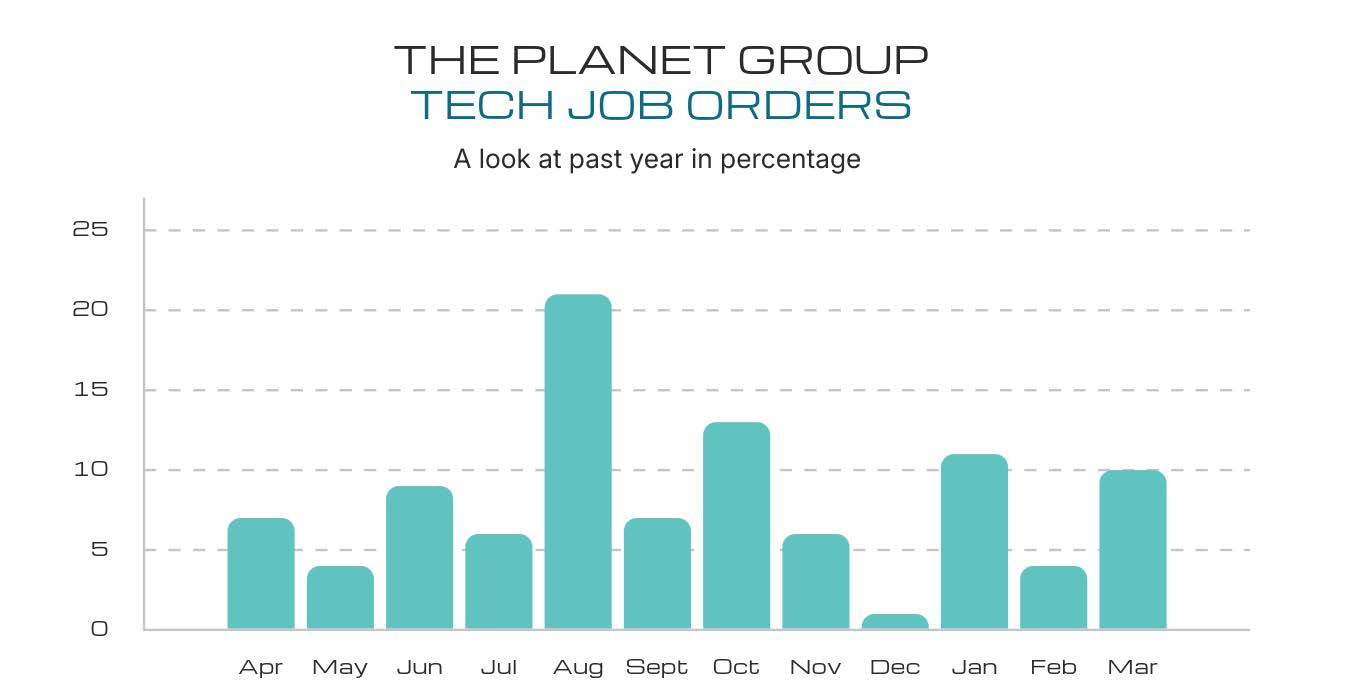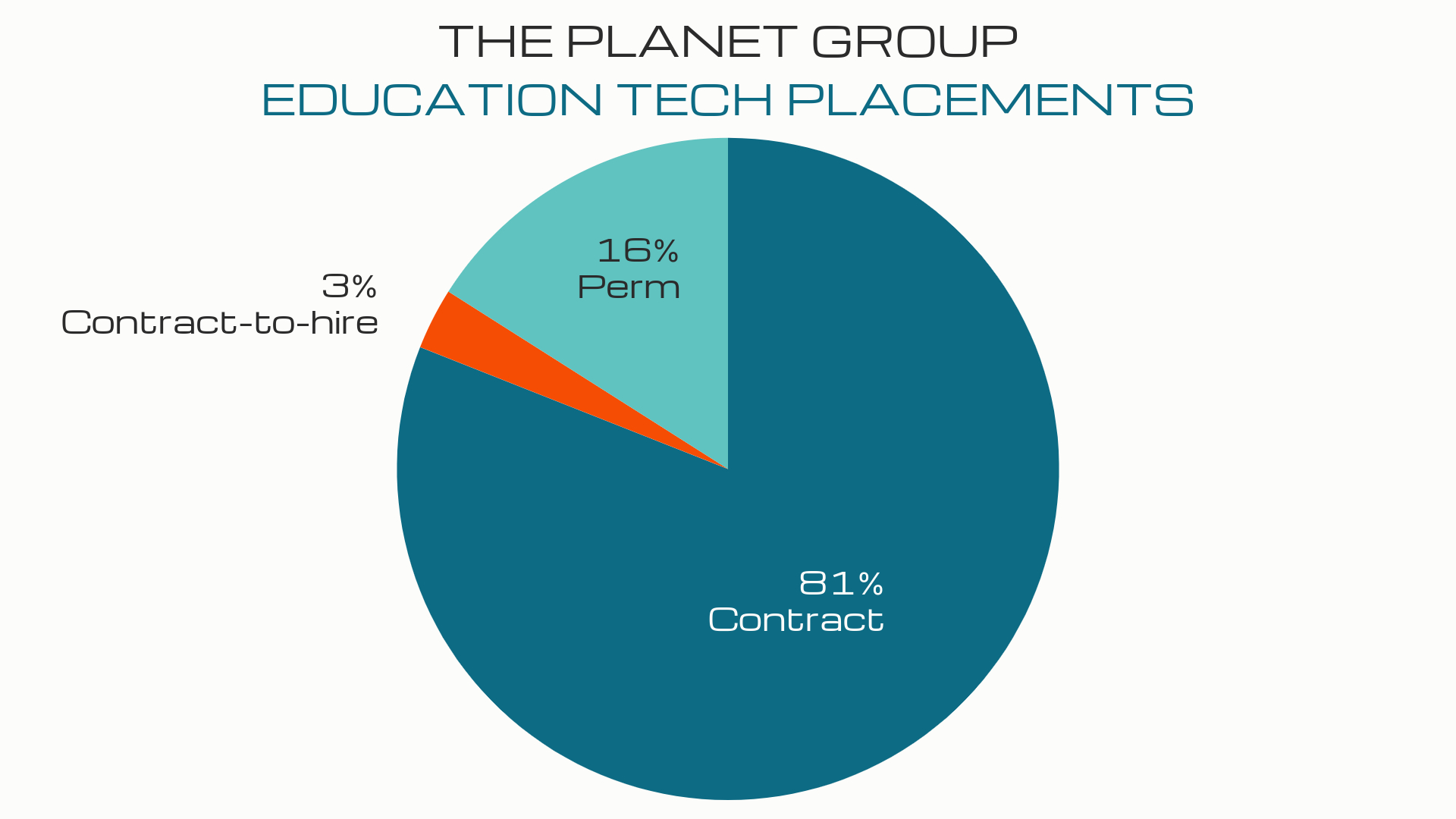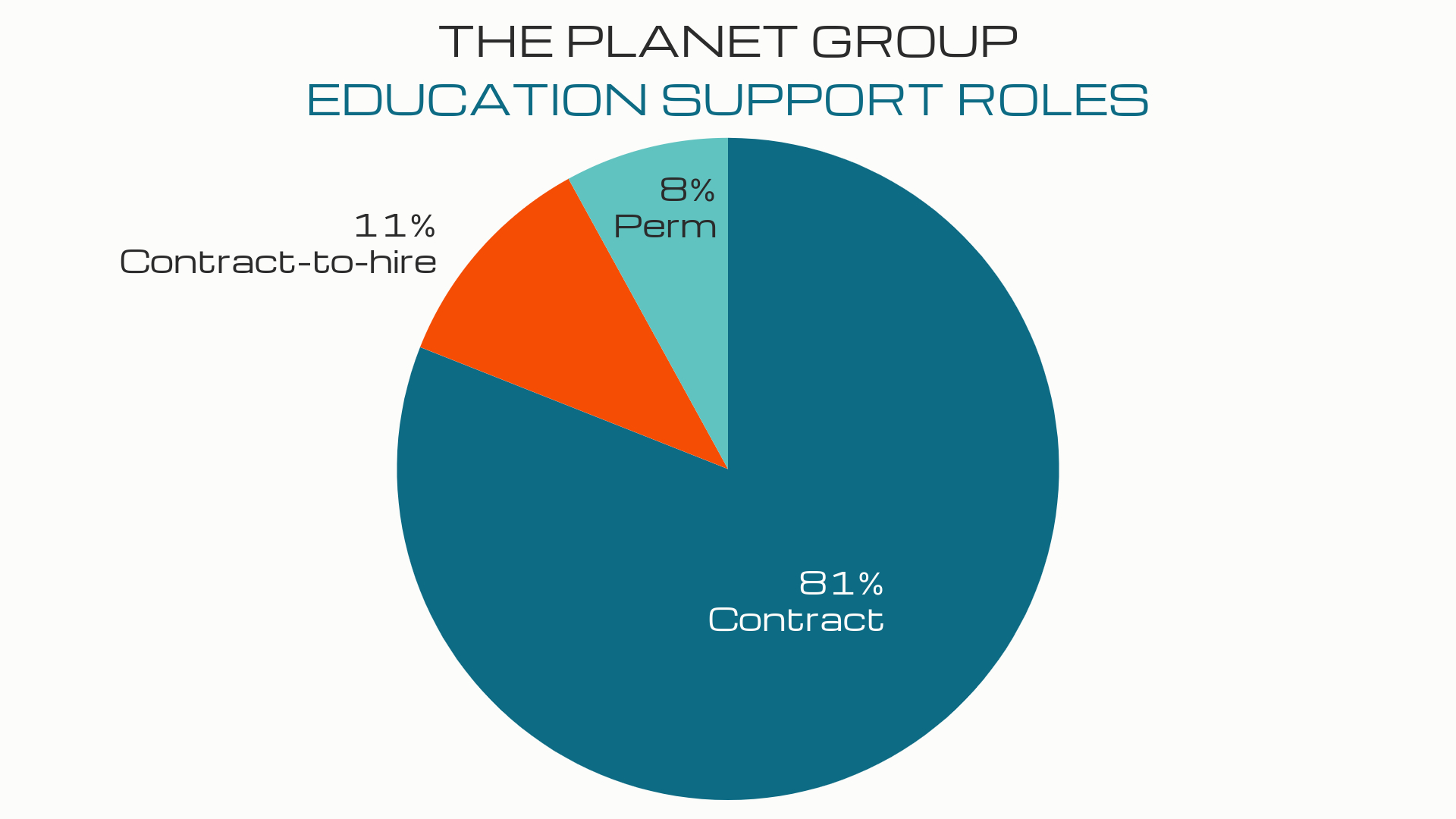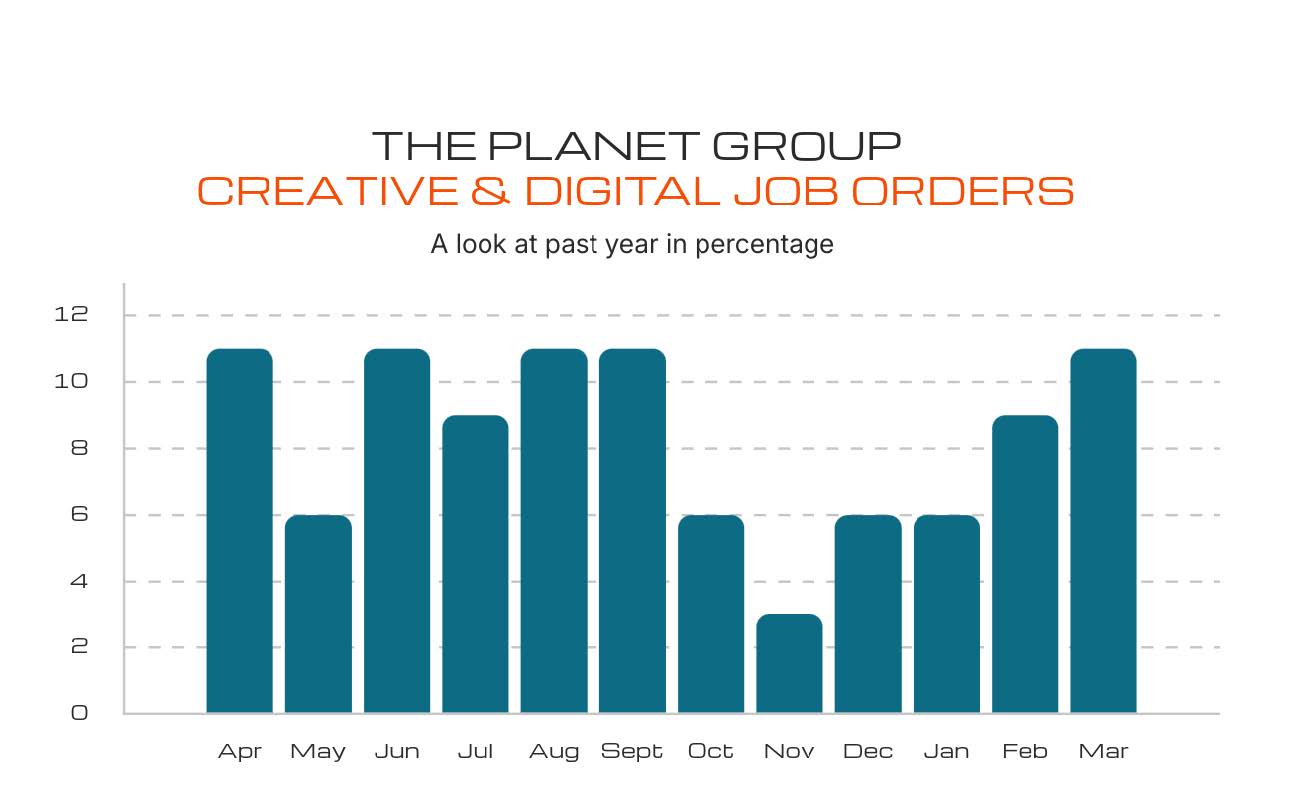The education sector is undergoing significant transformation. While traditional K-12 and higher education models remain foundational, innovative approaches are emerging. Technological advancements have made asynchronous and e-learning tools more accessible, catering to individuals seeking flexible skill development. Notably, the EdTech market in particular is projected to experience substantial growth, contributing significantly to the education sectorʼs expansion through 2030.
In this report, we will take a look at some of the key non-teaching and faculty roles driving this transformation — key experts across technology, marketing, human resources, and finance. These practice areas are critical to facilitating the learning process uninterrupted, and imparting knowledge to the next generation of leaders and professionals.

THE ROLE OF TECHNOLOGY IN EDUCATION
The COVID-19 pandemic in 2020 served as a catalyst for rapid technological adoption in education—an unexpected turning point that forced institutions to reimagine how learning was delivered. Almost overnight, schools and organizations had to pivot. Remote learning and digital connectivity quickly became essential, not just as a temporary solution but as a new way forward.
What began as a crisis response has since evolved into a long-term strategy. Many of the digital transformation initiatives introduced during that time—cloud migration, virtual collaboration tools, enhanced cybersecurity—now serve as foundational components for modern learning environments. Today, experts in IT, cloud infrastructure, system architecture, and AI continue to play an essential role in ensuring these solutions are scalable, secure, and effective.
Key Technological Advancements
- Device-Agnostic Access: Cloud-hosted platforms, such as Google Workspace for Education, enable students to access coursework and collaboration tools across various devices. Experts in cloud computing, mobile device management, and endpoint security are essential in implementing and maintaining these secure learning environments.
- Support for Flipped Classrooms: Cloud-based applications facilitate remote learning by allowing educators to distribute digital content outside traditional class hours. Specialized staff are crucial in configuring and supporting these platforms to ensure seamless student engagement.
- Simplified IT Management: Cloud-native tools automate updates, backups, and security protocols, reducing the IT burden on educators. Roles like Cloud Solutions Architects and IT Service Managers are instrumental in designing scalable, user-friendly systems that enhance instructional continuity.
- Technology Infrastructure Support: Building reliable cloud infrastructure requires deploying scalable servers, robust networks, and comprehensive cybersecurity measures. Professionals skilled in Network Engineering and Infrastructure Architecture ensure that cloud-based tools are effectively deployed and maintained.
- Enterprise Systems Integration: Integrating student information systems, identity management tools, and communication platforms necessitates sophisticated system design and data governance. Implementing Learning Management Systems (LMS) can significantly improve usability for educators and students alike.
Research indicates a growing trend among higher education institutions to adopt Enterprise Resource Planning (ERP) solutions. For instance, Workday offers a unified platform tailored to academia, centralizing student services, human resources, and financial processes. This integration reduces operational silos and enhances the overall experience for faculty, staff, and students.

A recent survey of our network asked companies what areas organizations are struggling the most to upskill employees.
- 41% Cloud & Enterprise Tech
- 9% Digital Marketing & Strategy
- 25% Financial Systems & Reporting
- 25% HR Tech & Talent Management

Our job openings over the past twelve months support this trend:
- 81% of technology placements have been contract roles
- 3% have been contract-to-hire
- 16% of clients have sought permanent hires
- 63% if roles were fully remote, while 37% required an on-site presence

SUPPORT STAFF'S ROLE IN FACILITATING LEARNING
Human Resources (HR), operations, and administrative professionals are pivotal in creating conducive learning environments within higher education. Large institutions rely on diverse staff to manage recruitment, benefits, performance management, and training for both staff and faculty, ensuring sustained learning and institutional vibrancy.
Many of these functional specialties are critical to facilitating learning and development within the workplace too. There’s been an increasing emphasis on upskilling and retraining as key to business success over the past several years, with operations, administrative, and HR experts functioning as a driving force for the new paradigm of continuous learning.

Key Functions in Continuous Learning & Upskilling
- Leadership & Management Training: Structured programs with progressive milestones, including coaching and scenario-based learning, support leadership development aligned with evolving business needs.
- Skills Gap Analysis & Upskilling: Regular training programs address identified skill gaps, keeping employees agile and aligned with industry demands.
- Compliance & Regulatory Training: Ongoing training modules and certification renewals ensure employees remain up-to-date with changing regulations.
- Digital & Technical Proficiency: Continuous learning through digital certifications and on-demand resources supports adaptation to new systems and tools.

Key hiring in education support roles:
- 81% Contract roles
- 11% Contract-to-hire positions
- 8% Permanent placements
- 10% Fully remote roles
- 90% On-site presence required

THE ROLE OF LEARNING MANAGEMENT SYSTEMS (LMS)
Learning Management Systems (LMS) provide a centralized platform for delivering, tracking, and managing training programs. For HR and operations teams, they streamline compliance, performance tracking, and employee development.
By supporting personalized learning paths and continuous progress tracking, LMS platforms help embed a culture of continuous learning across the organization, ensuring every role stays aligned with evolving business needs. While many of the key roles related to LMS are to be found across businesses, they require specific expertise. These roles include:
Key roles associated with LMS include:
- LMS Administrator: Manages day-to-day operations, including user account management and course uploads, ensuring smooth system performance.
- Learning & Development (L&D) Manager: Oversees training strategies, leveraging the LMS to support company-wide learning initiatives.
- LMS Data Analyst: Tracks and interprets data to assess learner engagement and training effectiveness, providing insights for continuous improvement.

A recent survey highlighted obstacles organizations face in strengthening learning and development:
- 36% Sustaining engagement
- 30% Gaining employee buy-in
- 18% Identifying best methods
- 16% Difficulty measuring results

A recent survey of our network asked organizations "What is the biggest obstacle to strengthening learning and development within your company?"
- 16% said difficulty measuring results
- 18% said identifying best methods
- 30% said gaining employee buy-in
- 36% said sustaining engagement
THE INTERSECTION OF DESIGN & EDUCATION
Learning today doesn’t just happen in classrooms or lecture halls. Over the years, more diverse and dynamic learning paths have taken shape—one of the most influential being the rise of EdTech. Short for Education Technology, EdTech broadly refers to digital tools that power learning experiences across a variety of settings, from university programs to enterprise training environments like HR-driven Learning Management Systems (LMS).
Because EdTech solutions offer 24/7 access and enable asynchronous learning, usability is everything. If a student or employee can’t navigate the platform easily, the learning process suffers. To be truly effective, these tools must be designed with real people—and real user needs—in mind.

UX and Marketing Within EdTech
- User Research: Understanding how students, educators, and administrators engage with digital platforms is essential to designing intuitive learning experiences. Thoughtful user research uncovers navigation challenges, motivation gaps, and areas where instructional delivery can be more efficient.
- Accessibility Design: EdTech should be built for everyone. Accessibility design ensures learners of all abilities can fully engage with digital content, through features like screen reader compatibility, keyboard navigation, and high-contrast visuals that promote equity and inclusion.
- Instructional Design: Strong design goes beyond aesthetics—it shapes how people learn. Especially in LMS platforms, a cohesive visual language reduces distractions, supports content clarity, and reinforces trust in the learning experience.
- Copy & Content Strategy: The right words guide learners forward. Strategic UX writing—clear microcopy, contextual tooltips, onboarding messages, and alerts—helps users focus on learning goals without unnecessary friction.
- Usability Testing: EdTech platforms are constantly evolving, and continuous usability testing ensures they stay intuitive. Real-user feedback highlights what’s working, what’s not, and where improvements can be made—before new features go live.
Although education has changed, its core function of it remains the same. Students, employees, and leaders of all kinds need continuous learning to achieve their full potential and make an impact. Whether in a classroom or in a workplace –in person or online – technology, design, and support staff have a crucial role to play in facilitating the learning process.
Our partners have worked with dozens of universities, EdTech companies, and clients with specific requirements in learning and development to meet a range of recruitment needs.
If you’re looking to hire and need a staffing firm, let’s set up a call to discuss our capabilities.
Download PDF >

ABOUT THE PLANET GROUP
The Planet Group is a global professional services firm delivering strategic staffing and advisory solutions. We operate at the intersection of talent and transformation – connecting the right people with the right opportunities in the areas of technology, engineering, accounting & finance, digital marketing, and manufacturing.
Named one of the fastest-growing private companies in the US, The Planet Group operates with a global reach and a performance-first mindset. We partner with clients to move fast, stay agile, and drive measurable results – building high-impact teams that fuel transformation and growth.

.svg)



